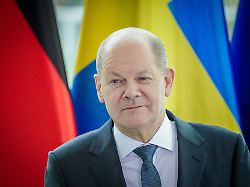Solution for e-fuels required
Scholz jumps to Wissing’s side in the burner dispute
03/15/2023, 5:20 p.m
Federal Transport Minister Wissing can count on the support of the Federal Chancellor in his protest against the EU-wide ban on e-fuels. Scholz is calling on the EU Commission to submit a proposal that would allow synthetic fuels to be used after 2035.
Chancellor Olaf Scholz defended Germany’s insistence on clarifying the use of eco-fuel in cars with combustion engines after 2035. Germany is not alone in wanting clarification, Scholz emphasized in Berlin after a meeting with Swedish Prime Minister Ulf Kristersson. Both politicians emphasized that the agreement in principle on the end of the combustion engine in the EU by 2035 was in place. Now it’s a question of details.
The EU wants to ban new cars with combustion engines from 2035. The final decision had to be postponed at the beginning of March because Federal Transport Minister Volker Wissing vetoed it at short notice. He calls for a binding definition of an exception rule for cars with combustion engines that fill up with e-fuels.
The Federal Government insists on the EU Commission’s promise of openness to technology, according to which the combustion engine can still be used in cars in the future if the vehicle can drive emission-free. Scholz emphasized that the Commission had undertaken to submit a proposal. He could not confirm reports that there was resentment against Germany in the EU, he added. “I’m optimistic that we can sort this out,” said Kristersson.
Meanwhile, Wissing defended its transport policy against criticism from the Federal Environment Agency (UBA) of the high greenhouse gas emissions. “The measures presented for our area for the immediate climate protection program are already being implemented,” he told the newspapers of the Funke media group. “The drive turnaround has been initiated and its ramp-up is increasing more and more.”
BMW and Porsche think e-fuels make sense
Among other things, Wissing referred to the increasing number of electric cars. “The expansion of the charging infrastructure is also making progress.” The state subsidy programs for converting diesel buses to e-buses are “in high demand” and the 49-euro ticket will “create an attractive offer for switching to public transport”, said Wissing.
He described the existing fleet of vehicles in Germany as the “main problem”. “For them, we urgently need all the tools to make them climate-neutral – such as synthetic fuels that we can use to reduce emissions.” He again alluded to the dispute with the Commission about e-fuels.
Several car manufacturers support Wissing’s request. Like Porsche, the car manufacturer BMW is also in favor of the development of synthetic fuels, so-called e-fuels. E-fuels are the only way to “make a substantial contribution” to the vehicle fleet, said BMW boss Oliver Zipse when presenting the annual balance sheet. “I very much agree with colleagues who are in favor of this – especially because our engines are prepared for it.”
A few days ago, Porsche CEO Oliver Blume, who is also head of the Volkswagen Group, defended e-fuels as a “sensible addition to the existing and niche market”. Synthetic fuels can be produced from hydrogen and CO2 in a climate-neutral manner, but they are still considered too expensive and inefficient. Currently, the fuel is only produced in pilot plants. Audi operates a test facility in Switzerland, Porsche is building a test facility in Chile. In addition, e-fuels currently play practically no role in the automotive industry.
